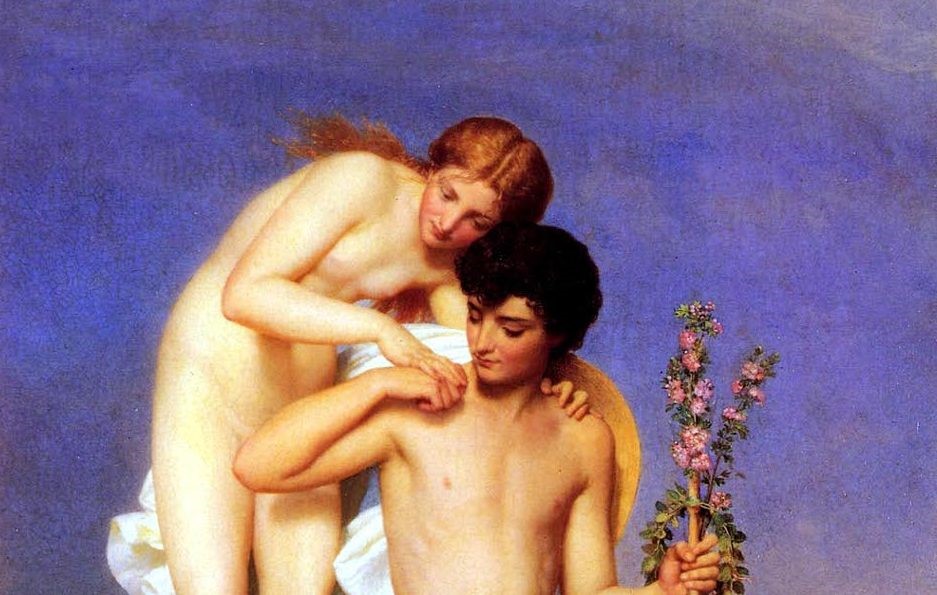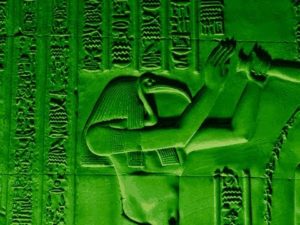 In the beginning, humans were androgynous. So says Aristophanes in his fantastical account of the origins of love in Plato’s Symposium.
In the beginning, humans were androgynous. So says Aristophanes in his fantastical account of the origins of love in Plato’s Symposium.
Not only did early humans have both sets of sexual organs, Aristophanes reports, but they were outfitted with two faces, four hands, and four legs. These monstrosities were very fast – moving by way of cartwheels – and they were also quite powerful. So powerful, in fact, that the gods were nervous for their dominion.
Wanting to weaken the humans, Zeus, Greek king of Gods, decided to cut each in two, and commanded his son Apollo “to turn its face…towards the wound so that each person would see that he’d been cut and keep better order.” If, however, the humans continued to pose a threat, Zeus promised to cut them again – “and they’ll have to make their way on one leg, hopping!”
The severed humans were a miserable lot, Aristophanes says.
“[Each] one longed for its other half, and so they would throw their arms about each other, weaving themselves together, wanting to grow together.”
Finally, Zeus, moved by pity, decided to turn their sexual organs to the front, so they might achieve some satisfaction in embracing.
Apparently, he initially neglected to do so, and, Aristophanes explains, the severed humans had “cast seed and made children, not in one another, but in the ground, like cicadas.” (a family of insects)
So goes Aristophanes’ contribution to the Symposium, where Plato’s characters take turns composing speeches about love – interspersed with heavy drinking.
It is no mistake that Plato gives Aristophanes the most outlandish of speeches. He was the famous comic playwright of Athens, responsible for bawdy fare like Lysistrata, where the women of Greece “go on strike” and refuse sex to their husbands until they stop warring.
What does Aristophanes’ speech have to do with love?
Is love a cure for our “wound?”
Aristophanes says his speech explains “the source of our desire to love each other.” He says,
Love is born into every human being; it calls back the halves of our original nature together; it tries to make one out of two and heal the wound of human nature. Each of us, then, is a ‘matching half’ of a human whole…and each of us is always seeking the half that matches him.”
This diagnosis should sound familiar to our ears. It’s the notion of love engrained deep in the American consciousness, inspiring Hallmark writers and Hollywood producers alike – imparted with each Romantic Comedy on offer.
Love is the discovery of one’s soulmate, we like to say; it is to find your other half – the person who completes me, as Jerry Maguire, Tom Cruise’s smitten sports agent, so famously put it.
As a philosopher, I am always amazed how Plato’s account here, uttered by Aristophanes, uncannily evokes our very modern view of love. It is a profoundly moving, beautiful, and wistful account.
As Aristophanes depicts it, we may see love as the cure for our wound, or the “wound of human nature.” So, what is this wound? On one hand, of course, Aristophanes means something quite literal: the wound perpetrated by Zeus. But for philosophers, talk of a “wound of human nature” suggests so much more.
Why do we seek love?
Humans are inherently wounded, the Greek philosophers agreed. At the very least, they concluded, we are prone to fatal habits, seemingly engrained in our nature.

Greek Goddess of Love, Aphrodite.
Aphrodite image via www.shutterstock.com
Humans insist on looking for satisfaction in things that cannot provide real or lasting fulfillment. These false lures include material goods, also power, and fame, Aristotle explained. A life devoted to any of these goals becomes quite miserable and empty.
Christian philosophers, led by Augustine, accepted this diagnosis, and added a theological twist. Pursuit of material goods is evidence of the Fall, and symptomatic of our sinful nature. Thus, we are like aliens here in this world – or as the Medievals would put it, pilgrims, on the way to a supernatural destination.
Humans seek to satisfy desire in worldly things, Augustine says, but are doomed, because we bear a kernel of the infinite within us. Thus, finite things cannot fulfill. We are made in the image of God, and our infinite desire can only be satisfied by the infinite nature of God.
In the 17th century, French philosopher Blaise Pascal offered an account of the wound of our nature more in tune with secular sensibilities. He claimed that the source of our sins and vices lay in our inability to sit still, be alone with ourselves, and ponder the unknowable.
We seek out troublesome diversions like war, inebriation or gambling to preoccupy the mind and block out distressing thoughts that seep in: perhaps we are alone in the universe – perhaps we are adrift on this tiny rock, in an infinite expanse of space and time, with no friendly forces looking down on us.
The wound of our nature is the existential condition, Pascal suggests: thanks to the utter uncertainty of our situation, which no science can answer or resolve, we perpetually teeter on the brink of anxiety – or despair.
Is love an answer to life’s problems?
Returning to Plato’s proposition, issued through Aristophanes: how many view romantic love as the answer to life’s problems? How many expect or hope that love will heal the “wound” of our nature and give meaning to life?
I suspect many do: our culture practically decrees it.

Is romantic love an answer to life’s problems?
Johnny Lai, CC BY
Your soulmate, Hollywood says, may take a surprising, unexpected form – she may seem your opposite, but you are inexplicably attracted nonetheless. Alternately, your beloved may appear to be initially boorish or aloof. But you find him to be secretly sweet.
Hollywood films typically ends once the romantic heroes find their soulmates, offering no glimpse of life post-wedding bliss, when kids and work close in – the real test of love.
Aristophanes places demands and expectations on love that are quite extreme.
“[When] a person meets the half that is his very own,” he exclaims, “something wonderful happens: the two are struck from their senses by love, by a sense of belonging to one another, and by desire, and they don’t want to be separated from one another, not even for a moment. These are people who finish out their lives together and still cannot say what it is they want from one another.”
This sounds miraculous and alluring, but Plato doesn’t believe it. Which is why he couches it in Aristophanes’ satirical story. In short: it’s all quite mythical.
Does true love exist?
The notion of “soulmate,” implies that there is but one person in the universe who is your match, one person in creation who completes you – whom you will recognize in a flash of lightening.
What if in your search for true love, you cast about waiting or expecting to be star-struck – in vain? What is there isn’t a perfect partner that you’re waiting for?
Is this one reason why, as the Pew Research Center reports, we see a record number of unmarried Americans?
Alternately, what if you dive into a relationship, marriage even, expecting the luster and satiation to endure, but it does not, and gives way to…ordinary life, where the ordinary questions and doubts and dissatisfactions of life reemerge and linger?
In his book Modern Romance, actor and comedian Aziz Ansari tells of a wedding he attended that could have been staged by Aristophanes himself:
“The vows…were powerful. They were saying the most remarkable things about each other. Things like ‘You are a prism that takes the light of life and turns it into a rainbow’…”
The vows, Ansari explains, were so exultant, so lofty and transcendent, that “four different couples broke up, supposedly because they didn’t feel they had the love that was expressed in those vows.”
Enduring love is more mundane
Love is not the solution to life’s problems, as anyone who has been in love can attest. Romance is often the start of many headaches and heartaches. And why put such a burden on another person in the first place?
It seems unfair. Why look to your partner to heal an existential wound – to heal your soul? This is an immense responsibility no mere mortal can address.
I accept the backhanded critique Plato offers here through Aristophanes. Though I am hardly an expert on the matter, I have found his message quite accurate in this respect: true love is far more mundane.
I should specify: true love is mundane in its origins, if not in its conclusion. That is to say, true love is not discovered all of a sudden, at first sight, but rather, it’s the product of immense work, constant attention, and sacrifice.
Love is not the solution to life’s problems, but it certainly makes them more bearable, and the entire process more enjoyable. If soulmates exist, they are made and fashioned, after a lifetime partnership, a lifetime shared dealing with common duties, enduring pain, and of course, knowing joy.
Firmin DeBrabander, Professor of Philosophy, Maryland Institute College of Art
This article was originally published on The Conversation.





